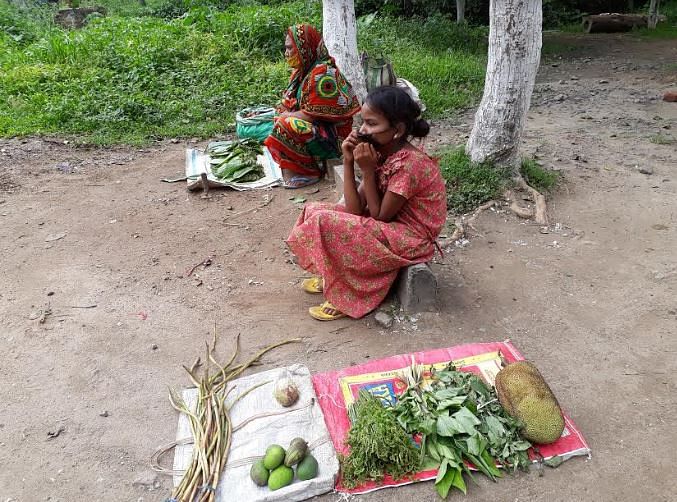
Her face is well covered with a mask. But Rumi Kumari (name changed) refused to turn left while being photographed.
"I don't sell vegetables always. Now that my father's work is closed and we don't have school too, I came here to earn whatever little I can," the 13-year girl selling vegetables told DH as she got busy with customers enquiring about prices of the raw jackfruit and mangoes she was selling near Rehabari market in Guwahati.
The roadside tea stall Rumi's father runs remained shut since March 24, when the country-wide lockdown was clamped as a preventive measure to avoid Coronavirus infection. Her mother, who works as a maid too could not go to her work due to the lockdown. "My father remained idle at home for about a month. Then he decided to sell vegetables as it is allowed by the police. But since his income is very less, I am trying to help the family," Rumi, who now earns about Rs. 100 by selling vegetables daily further said.
Most private schools in Guwahati are conducting online classes during the lockdown but the government-run schools like the one where Rumi studies are not doing so.
Two boys, aged about 14 years were also seen selling vegetables in a crowded roadside market less than half-a-kilometer away. The story is almost similar--their parents' income has been severely hit and it was becoming impossible to run a family of six. "We wake up at 5:00 am to buy the vegetables from the wholesale market. We rush here in a bi-cycle before this space is occupied by others," one of them said, with a request not to click a photo. "If we don't work, it will be impossible for my father to pay for the house rent of Rs. 3,000 this month," he added. Both did not have a mask.
The economic blow the lockdown has given forced many children in Assam like them to become vegetable sellers. Many children are still seen selling vegetables and watermelons along the highways to help their parents earn some extra during the lockdown.
The plight of such children has not yet drawn any attention from the administration or the child rights bodies but activists termed it very disturbing. "Most of these children belong to urban poor families, who either live on the hills in and around Guwahati or in rented houses. Their parents work as rickshaw pullers, daily wagers, run street-side tea stalls, or work as maids. Most of them study in government schools and depend on the mid-day meal for lunch as their parents remain out for work till evening. Now that their parents' income has stopped and they don't get a mid-day meal, they are now forced to earn themselves. These are very disturbing development," Indrani Tahbiildar, a child rights activist in Guwahati told DH.
Tahbildar, a former member of the Assam State Commission for Protection of Child Rights said this could even increase the problem of child labour and school drop-outs even after the lockdown is completely lifted. "Whatever a little they are earning now can motivate to carry on with such work in the future too. And their parents may not stop them as their income too will remain affected for a long time from now," she said.
"Such families need urgent financial support and motivation before asking them not to push their children to work," she said.
According to the 2011 census, nearly 5% of children aged between 5 and 14 years in Assam are engaged in income-generating works. Another survey said the school drop out rate at the primary level stood at 10.1%.